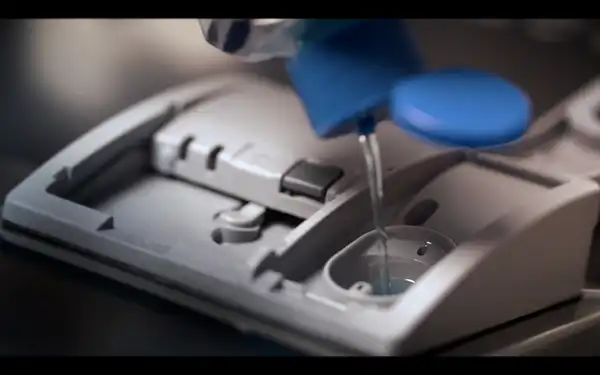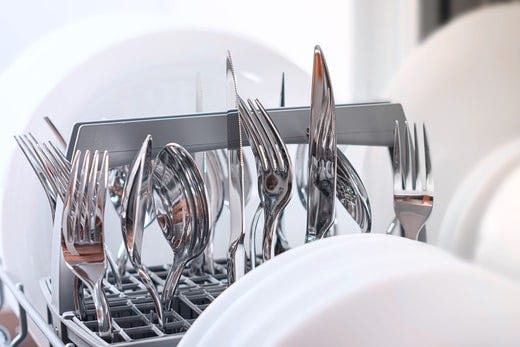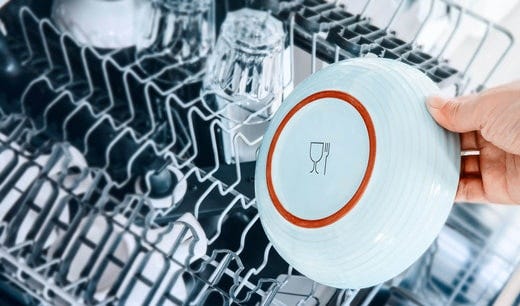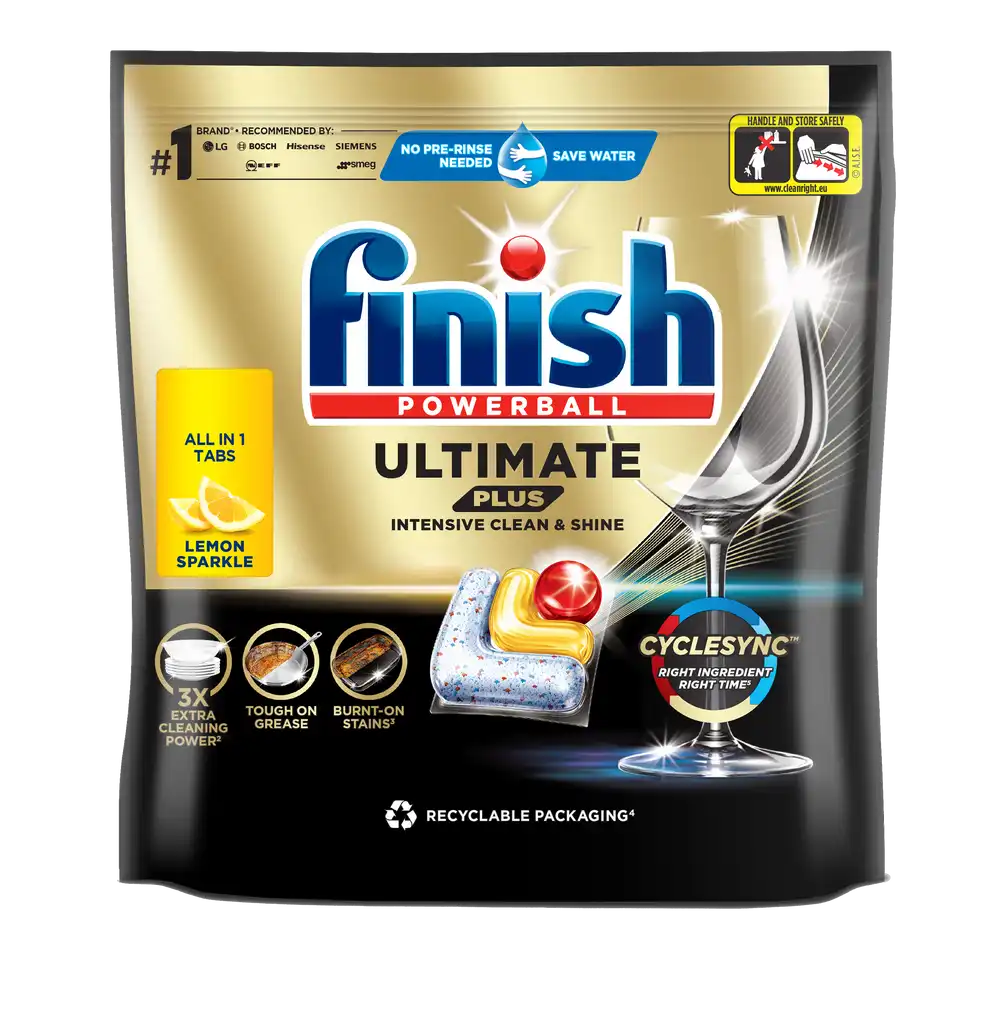
How to clean glass in the dishwasher
From those annoying cloudy stains on your glasses to how to get your glassware sparkling, here’s our guide to cleaning glass in the dishwasher.
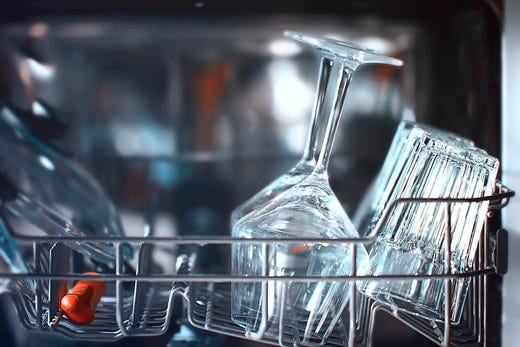
Glassware can be some of the most frequently used items in the household, and as a result, some of the most often washed in the dishwasher. However, repeated washing and high temperatures can cause cloudy stains to appear on those much-loved glass items.
There are two main causes of cloudy glassware, and both tend to happen over time. The first is due to hard water deposits, and the other is caused by corrosion. These two different types of clouding require different precautions to prevent them from happening when cleaning glass baking dishes or drinking glasses.
Cloudy glass & hard water deposits
If you live in a hard water area, you may be faced with mineral deposits gathering in your dishwasher. Hard water can be problematic for dishwashers, as the minerals in the water can appear as cloudy marks on glasses and dishes. These deposits, such as limescale, can cling onto your glassware and dishes, causing white spots or clouding. To combat the problems driven by hard water, always keep Salt and Rinse Aid topped up in your dishwasher. Salt will soften water and enable your detergents to work better and prevent spots caused by hard water, leaving you with sparkling clean. Rinse Aid will protect your glasses further ensuring brilliant shine. Always use a good quality detergents, like Finish Quantum Ultimate, on top of Salt and Rinse Aid for the best cleaning results.
What can you do to prevent cloudy glasses?
Fortunately, this sort of glass clouding can be fixed and easily prevented if you follow the below tips:
- Give your dishwasher a regular, thorough clean with Finish Dishwasher Cleaner to help remove the nasty debris that can get left behind after a wash, like grease grime and limescale – before it can cling to your glassware.
- Add Finish Rinse Aid to your cycle to ensure that water droplets that form on surfaces are dispersed before they can evaporate and leave behind any lime-scale residue.
- Keep Finish Salt in your dishwasher at all times to soften water and avoid white marks from limescale deposit on your glasses.
- Adjust the temperature of the dishwasher or try using a different dishwasher cycle. Some dishwashers have a glassware setting, or you can manually adjust the temperature to bring your wash onto a lower temperature cycle. This gentler cycle should help reduce clouding.
Glass corrosion
If you’re living in a soft water area then you’re particularly at risk of corrosion, another kind of glassware clouding, but it can happen anywhere. This can be caused by a number of factors, from heat exposure and poor glass quality to detergent type and lengthy programme cycles. Therefore, use our Rinse Aid to prevent this from happening and, to protect colour fading, you can use Finish Glass Protector. This is a specific product to protect and prevent corrosion and colour fading.
How to prevent glass corrosion in your dishwasher
There are a number of ways to prolong the life of your glassware and prevent cloudy glasses in your dishwasher, and it’s important to get it right before the irreversible effects of corrosion occur:
- When buying glassware, ensure they are dishwasher safe.
- Use a dishwasher detergent like Finish Quantum Ultimate to keep your glassware looking shiny for longer.
- If you have a water softener unit, check to make sure it isn’t on too high of a setting.
- For more delicate glassware, wash at a low temperature, or on a glass washing setting.
- Once your dishwasher cycle has finished, open the dishwasher to allow excess steam to escape. Modern machines take care of this with internal fans. Allow your glassware to cool in the washing machine before removing them.
Now that you understand the cause, read on for more information about how to avoid these annoying cloudy stains on your favourite glass kitchen items before your next big dinner party.
How to clean drinking glasses in the dishwasher
Every day we use and reuse glasses over and over again, but with every wash, your glasses can go cloudy. Take a look at some of our top tips below for making sure your glasses sparkle out of the dishwasher, every time.
- Load your glasses onto the top rack, away from any other dishes.
- To get the best results, use Finish Rinse Aid to help avoid watermarks appearing on your glasses, as well as preventing extra washing and wiping after your dishwashing cycle has finished.
When it comes to storing glasses after they’ve come out of the dishwasher, there are two options: rim up or rim down.
Having the glass rest on its rim avoids dust and other nasties settling in the glass, but having it stand on its base means the part that you drink from doesn’t get contaminated by the bottom of a cupboard and runs less risk of getting chipped. The choice, we’re afraid, is up to you.
How to clean wine glasses in the dishwasher
Cleaning wine glasses in the dishwasher can be perfectly safe – as long as you are careful about how you load your machine.
- If possible, load your wine glasses on the top rack - you may have to lower the rack to make space. Make sure they’re not touching each other, as this could cause them to crack as they knock together.
- Sturdier wine glasses (those with thicker rims and stems) can also be arranged on the bottom rack, as long as they are secure and separate from other items.
- Many modern dishwashers have a delicate or glassware setting. The lower temperature and gentler jets are ideal for washing wine glasses.
- Make sure to add Finish Rinse Aid to help prevent water spots and cloudy glasses.
So, there you have it, just a few simple things to keep in mind when looking after your glasses to ensure that they stay looking shinier for longer.
